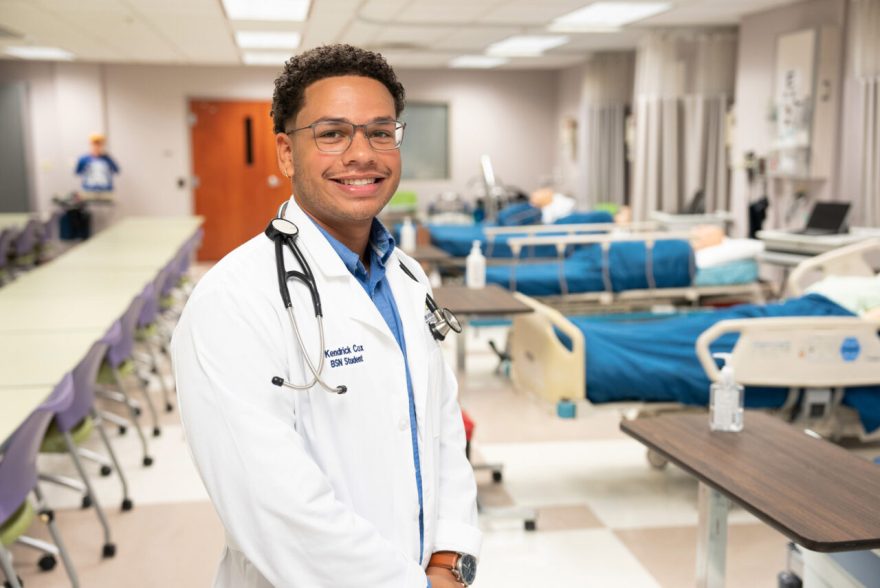
Emmanuella Ingabire, a senior in the UTC School of Nursing, was one of six statewide recipients of BlueCross BlueShield of Tennessee Foundation BlueCross Power of We Scholarships (photo credit: Eric Lisica/BlueCross BlueShield of Tennessee).
Three students at the University of Tennessee at Chattanooga have won $10,000 each for their outstanding academic performance.
The BlueCross BlueShield of Tennessee Foundation has been awarding scholarships to minority students who excel academically since 2013. The BlueCross Power of We Scholarship addresses the lack of representation in health care by supporting minorities studying to become health care professionals.
The program has awarded $415,000 in scholarships to 44 students since its inception. In 2022, one of the six honorees was a UTC student, Zennia Nesmith. This year, half of the honorees are Mocs.
Kendrick Cox, Destini Givens and Emmanuella Ingabire all plan a future in health care.
Cox and Ingabire are seniors in the UTC School of Nursing. Cox is from Cleveland, Tennessee, and commutes to Chattanooga. Throughout nursing school, clinicals and working part-time at CHI Memorial Hospital, he also has kept a job at a Cleveland restaurant that he began at 16.
With his Power of We scholarship winnings, he can cut his working hours to one day a week and better focus on his studies.
“The scholarship will help ease that financial burden. Even books aren’t cheap. I paid over $500 to get my books this semester, and that’s out of pocket. So that’s a weight lifted off my shoulders, one less thing I have to worry about,” said Cox.
Ingabire was born in the Democratic Republic of the Congo but immigrated to the U.S. with family when she was eight months old. She was born with a congenital heart disease that required life-saving surgery. She and her family traveled across the Atlantic to Birmingham, Alabama, where Ingabire began to rack up her hospital experience as an infant. They lived in Huntsville, Alabama, for eight years before moving to Nashville.
Looking back on her medical history motivated her to pursue a career in health care.
“I couldn’t imagine what it was like for my parents to have a child who is sick. It takes so much teamwork to be able to successfully go through what they went through,” she said.
Receiving the scholarship has only encouraged her further. “The scholarship elevated me and motivated me to really focus,” she said.

Senior psychology major Destini Givens (photo credit: Eric Lisica/BlueCross BlueShield of Tennessee)
Givens is the only psychology major among the six scholarship recipients. She has lived in Chattanooga since she was 13, but she will spend her senior year of college attending UTC from Smyrna, Tennessee, a two-hour drive away.
Attending school online works for her jam-packed schedule. She has worked full-time throughout her time as a UTC student. Previously, she took night classes, but now she can finish her upper-level courses from home.
She attributes her academic success to that rigorous schedule.
“I’m a very structured person, so working full-time and going to school has been the reason I’m so successful. Because of my type-A personality, I have a schedule and I stick to it; I don’t procrastinate. Taking online classes helps me get things done at my own pace,” said Givens.
It was Givens’ personal experience with mental health that led her to go into psychology.
“I had my own personal struggles, and it was something that I thought that everybody dealt with until I realized that not everybody deals with certain things. After that, I was like, okay, there’s people out here that need help,” said Givens.
Givens is passionate about seeing more minority representation in mental health.
“From my personal experience, having somebody that looked like me and I felt like could relate to me would’ve been pivotal in me overcoming things that I didn’t overcome until I was in my twenties,” she said.
“I struggled with PTSD because my house burnt down when I was in sixth grade. My mom tried to get me into therapy, but none of my doctors or therapists understood. It wasn’t until I was in my 20s that I was able to realize [my therapist] may not understand me from my full perspective, but he’s trying, and one day I’ll be able to do that,” she said.
Cox and Ingabire share their vision of a future with more diverse representation in health care.
Cox said, “Employing more health care workers that are minorities will help patient outcomes. I think communication will improve. Patient anxiety will be reduced, and we’ll have overall better patient outcomes.”
Ingabire also recognizes the importance of the award.
“I love the scholarship because they know the health care disparities that lie within marginalized communities. To minimize that gap, we have to start with the providers who are taking care of them,” she said.
Learn More
Destini Givens’ journey to UTC

Senior nursing major Kendrick Cox (photo credit: Eric Lisica/BlueCross BlueShield of Tennessee)
